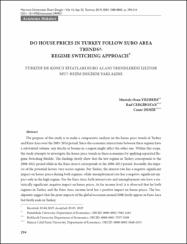| dc.contributor.author | Yıldırım, Mustafa Ozan | |
| dc.contributor.author | Cergibozan, Raif | |
| dc.contributor.author | Demir, Caner | |
| dc.date.accessioned | 2021-12-12T16:49:52Z | |
| dc.date.available | 2021-12-12T16:49:52Z | |
| dc.date.issued | 2019 | |
| dc.identifier.issn | 1300-0845 | |
| dc.identifier.issn | 1300-0845 | |
| dc.identifier.uri | https://doi.org/10.14783/maruoneri.594957 | |
| dc.identifier.uri | https://app.trdizin.gov.tr/makale/TXprMk1UZ3pNdz09 | |
| dc.identifier.uri | https://hdl.handle.net/20.500.11857/2131 | |
| dc.description.abstract | The purpose of this study is to make a comparative analysis on the house price trends of Turkey and Euro Area over the 2003-2016 period. Since the economic interactions between these regions have a substantial volume, any shocks or booms in a region might affect the other one. Within this scope, the study attempts to investigate the house price trends in these economies by applying separated Regime Switching Models. The findings firstly show that the low regime in Turkey corresponds to the 2008-2012 period while in the Euro Area it corresponds to the 2006-2013 period. Secondly, the impacts of the potential factors vary across regions. For Turkey, the interest rate has a negative significant impact on house prices during both regimes, while unemployment rate has a negative significant impact only in the high regime. For the Euro Area, both interest rate and unemployment rate have a statistically significant, negative impact on house prices. As for income level, it is observed that for both regimes in Turkey and the Euro Area, income level has a positive impact on house prices. The breakpoints suggest that the prior impacts of the global recession around 2008 firstly appear in Euro Area but firstly ends in Turkey. | en_US |
| dc.description.abstract | Bu çalışmanın amacı, 2003-2016 dönemi için Türkiye ve Euro Alanı’nın konut fiyat trendleri üzerine karşılaştırmalı bir analiz yapmaktır. Bu bölgeler arasındaki ekonomik etkileşimler kayda değer bir hacme sahip olduğu için bir bölgede meydana gelen herhangi bir şok veya canlanma diğerini de etkileyebilmektedir. Bu çerçevede, çalışma, bu ekonomilerdeki konut fiyat trendlerini ayrışık rejim değişim modelleri uygulayarak araştırmaya çalışmaktadır. Bulgular öncelikle, Euro Alanı’nda düşük rejim 2006-2013 dönemine denk düşerken Türkiye’de 2008-2012 dönemine denk düştüğünü göstermektedir. İkinci olarak, potansiyel faktörlerin etkileri bölgeden bölgeye farklılık göstermektedir. Türkiye için, faiz oranı her iki rejimde de negatif anlamlı bir etkiye sahipken işsizlik oranı sadece yüksek rejimde negatif anlamlı bir etkiye sahiptir. Euro Bölgesi için ise hem faiz hem de işsizlik oranı konut fiyatları üzerinde istatistiki olarak anlamlı, negatif bir etkiye sahiptir. Gelir düzeyi açısından ise, Türkiye ve Euro Alanı’nda her iki rejimde de gelir düzeyinin konut fiyatları üzerinde pozitif bir etkisi olduğu gözlenmektedir. Rejimlerin kırılma noktaları 2008 yılında meydana gelen küresel durgunluğun öncül etkilerinin ilk olarak Euro Alanı’nda ortaya çıktığını ancak ilk olarak Türkiye’de sona erdiğini ortaya koymaktadır. | en_US |
| dc.language.iso | eng | en_US |
| dc.relation.ispartof | ÖNERİ | en_US |
| dc.identifier.doi | 10.14783/maruoneri.594957 | |
| dc.rights | info:eu-repo/semantics/openAccess | en_US |
| dc.subject | [No Keywords] | en_US |
| dc.title | DO HOUSE PRICES IN TURKEY FOLLOW EURO AREA TRENDS?: REGIME SWITCHING APPROACH | en_US |
| dc.title.alternative | TÜRKİYE’DE KONUT FİYATLARI EURO ALANI TRENDLERİNİ İZLİYOR MU?: REJİM DEĞİŞİM YAKLAŞIMI | en_US |
| dc.type | article | |
| dc.department | Fakülteler, İktisadi ve İdari Bilimler Fakültesi, İktisat Bölümü | |
| dc.identifier.volume | 14 | en_US |
| dc.identifier.startpage | 294 | en_US |
| dc.identifier.issue | 52 | en_US |
| dc.identifier.endpage | 314 | en_US |
| dc.relation.publicationcategory | Makale - Ulusal Hakemli Dergi - Kurum Öğretim Elemanı | en_US |



















